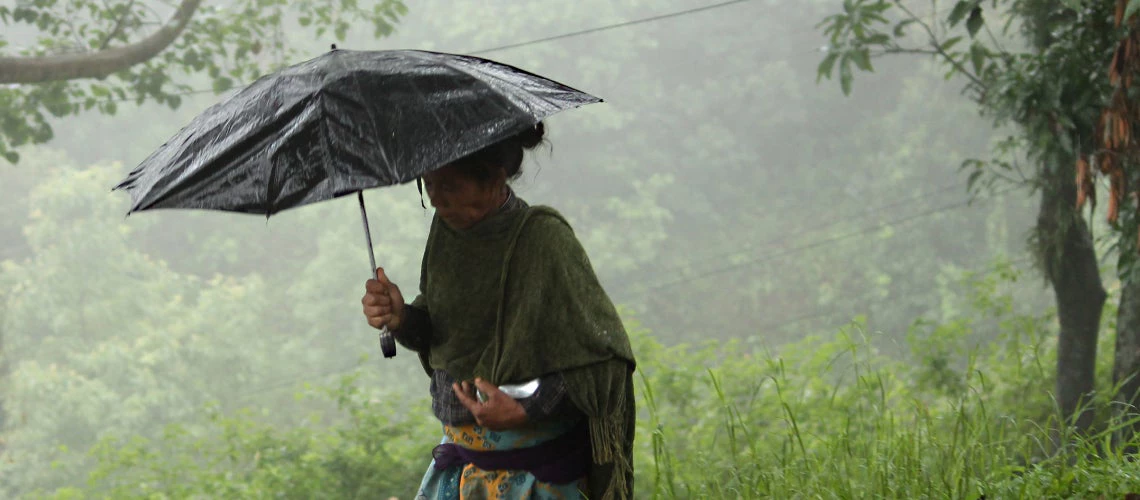 A woman walks under an umbrella in rural Nepal. Photo © Aisha Faquir/World Bank
A woman walks under an umbrella in rural Nepal. Photo © Aisha Faquir/World Bank
Climate change policies and strategies enacted at the central government levels in India, Nepal and Sri Lanka have failed to meet expectations at local levels. A new report suggests how these countries can integrate local actions into their national climate goals.
South Asia is home to nearly a quarter of the world’s population and is considered most vulnerable to the impact of climate change. Extreme weather and climate-related disasters such as avalanches, erratic rainfall, drought, cyclones, floods, and landslides are recurring phenomena in the region. A recent PEFA research report investigated the extent to which governments in India, Nepal, and Sri Lanka prioritized climate-related plans in their national budgets and the extent to which local governments executed these plans.
The research findings clearly show that all three countries set clear climate-change policies and priorities at the national level with budget allocations for areas such as renewable energy, waste management, sustainable agriculture, transportation and construction, and disaster management. All three countries promote private sector investments and public-private partnerships in climate, which has helped them achieve many of their NDC (Nationally determined contributions (NDCs) are at the heart of the Paris Agreement and the achievement of its long-term goals. NDCs embody efforts by each country to reduce national emissions and adapt to the impacts of climate change) goals. However, such policies and strategies have failed to meet expectations at local levels. They are poorly integrated into state and local budgeting processes.
For instance, in the Kosi River region of Nepal, overlapping of climate-related activities with other government activities, coupled with the absence of appropriate accounting to trace climate budgets and investments at the local level, has negated initiatives undertaken at the central level. In the Indian state of Kerala, local priority has continued to be placed on disaster management and disaster-risk reduction, which has overshadowed the long-term national climate agenda. In the Western Province of Sri Lanka, the absence of a separate climate budget means that reliable and integrated data on the impact of climate change are missing at the local level. Climate funding has to a large extent been subsumed and mobilized within disaster management. In all three countries, a proper mechanism, including a channel to disseminate climate policies and strategies at the state and local levels, is largely absent. This is further exacerbated by a lack of well-trained and committed bureaucrats and local leaders, as well as limited community participation and engagement in climate change-related activities.
The report concludes with a number of recommendations to South Asian governments to be considered before setting up future climate policies and priorities. These include:
- Effective integration of central government climate policies within state/province and local government functions
- Establishing separate climate coordination and monitoring departments at central, state, and local levels
- Committing a proportion of the national budget to the ‘climate budget’ and allocating it to state and local government authorities
- Empowering local authorities to source additional funds and to develop a policy framework to use allocated funds effectively
- Seeking community participation in climate investments and enhancing community awareness programs on climate change
- Setting up climate auditing and performance reviews
- Considering ‘climate-smart spending’ as a policy area
These recommendations address the need for capacity building, facilitating decentralized strategies across the value chain, strengthening outreach, knowledge, and communication on the impact of climate change, and setting up appropriate budgets and public financial-management systems to deliver effective climate allocations. The recommendations clearly stress the need for people participation at the grassroots level for the success of any program that seeks to mitigate the negative effects of climate change.
The authors are from the Essex Business School, University of Essex, the United Kingdom. They facilitated the research referred to in this blog through qualitative content analysis by reviewing climate-related government documents. They also conducted field studies in Kerala state in India, the Kosi River zone and region (Provinces 1 and 2) in Nepal, and the Western Province in Sri Lanka.






Join the Conversation